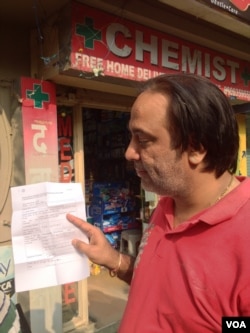Housewife Tripta Bareja is among millions of Indians who stood in snaking lines outside banks on Thursday as they scrambled to swap high value currency notes, which have been scrapped in a sudden move aimed at rooting out graft.
The resident of Gurgaon near New Delhi arrived at her neighborhood bank at 8.30 am -- an hour and a half before it opened after shutting for a day to stock currency.
Like countless others, Bareja is short of money to stock up on essentials like food. “We have no small denomination notes at home. When we withdrew money from banks, it was always in 1000 ($15) and 500 rupee ($7.50) notes,” she says.
Many experts have hailed the move to scrap these notes as the country’s biggest and boldest step to stamp out corruption and flush out tax evaders, who are estimated to have stashed away billions of dollars in cash. But skeptics warn the impact will be short-lived in a country where corruption has deep tentacles.
Economic disruptions
Only time will tell who is proven right, but for the moment, withdrawal of high currency notes has caused disruptions in an economy where 80 percent of all transactions are made in cash.
With a mind boggling 23 billion notes to be exchanged, the transition to the new currency will not be easy. Officials say it will take three to four weeks to inject new high-value notes into the banking system.
As lines grew longer outside banks, the government sent out a reassuring message. “We are trying to ensure at the earliest that the requisite currency is available with people. We do believe there is no need to rush in the initial days because people have a lot of time,” Finance Minister Arun Jaitley said.
In a country where there is deep resentment about corruption that allegedly involves officials, politicians and businesses, many ordinary men and women waiting in lines said they were prepared to endure hardship for a few days if it mean cleaning out the system.
Storeowner Ramesh Chhabra said he has hardly transacted any business since the high value notes were scrapped because he does not have change to return to customers. But shrugging, he pointed out that it is for a good cause. “We have to face this problem for a few days. I don’t mind the inconvenience,” he said.
Business has dipped at restaurants and stores and may not pick up anytime soon. It has also caused consternation in the midst of a busy wedding season when many transactions are made in cash, whether it is to jewelers or caterers.
Managing the exchange
But perhaps the worst impacted are millions of poor and illiterate people – laborers, small vendors and housemaids, who are at a loss about how to manage the exchange.
Days ago, housemaid Tetri Nuniya was paid her monthly salary in 1,000 rupee notes that are now no longer legal tender. “I don’t know how to change them,” she said, adding that she worries about how to buy her monthly rations until her employers give her small denomination notes.
Officials say the scrapping of high value currency is part of a larger crackdown on corruption, which Prime Minister Modi vowed to root out when he came to power.
The unexpected move, announced in an unscheduled address to the nation on Tuesday night, comes half way through his term as he faces questions over slow anti-graft progress.
Saying that a decisive step was needed, Modi said India, which was ranked 100 on global corruption rankings, has only moved up to 76 despite steps his government had taken.
The government also says it is not just taking aim at graft, but also terrorism. Officials say large amounts of counterfeit currency notes are brought into the country by terrorists, and scrapping the existing high value currency will disrupt their works. The new notes, the government says will have stronger security features, making them harder to counterfeit.
Skeptics
But skeptics question how much the latest measure will actually dent corruption.
Dev Kar, the chief economist at the research and advocacy organization Global Financial Integrity, called it a “cosmetic solution” to a massive and growing problem. The group estimates India lost more than $ 500 billion in the decade between 2004 and 2013 to illicit outflows from the country.
“The effect will be temporary, it will inconvenience the people who are operating in the underground economy. This inconvenience will last until they are not able to come up with an alternate way of financing,” he said, pointing out that future kickbacks could easily be paid in foreign currency.
Saying that governance will have to improve in a credible, sustainable way before India can hope to win the battle against what is called “black money,” Kar said he has seen no concrete steps on that front or strict legal action that is needed to deter corruption: “Jail times, severe penalties, draconian laws that are enforced in a transparent, timely manner, regardless of who they are.”
Some political observers also suspect the timing of the move could be intended to deprive political rivals of Modi’s Bharatiya Janta Party of piles of untaxed cash, commonly used by political parties across the spectrum to finance expensive election campaigns.












